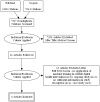Applications of Machine Learning in Real-Life Digital Health Interventions: Review of the Literature
- PMID: 30950797
- PMCID: PMC6473205
- DOI: 10.2196/12286
Applications of Machine Learning in Real-Life Digital Health Interventions: Review of the Literature
Abstract
Background: Machine learning has attracted considerable research interest toward developing smart digital health interventions. These interventions have the potential to revolutionize health care and lead to substantial outcomes for patients and medical professionals.
Objective: Our objective was to review the literature on applications of machine learning in real-life digital health interventions, aiming to improve the understanding of researchers, clinicians, engineers, and policy makers in developing robust and impactful data-driven interventions in the health care domain.
Methods: We searched the PubMed and Scopus bibliographic databases with terms related to machine learning, to identify real-life studies of digital health interventions incorporating machine learning algorithms. We grouped those interventions according to their target (ie, target condition), study design, number of enrolled participants, follow-up duration, primary outcome and whether this had been statistically significant, machine learning algorithms used in the intervention, and outcome of the algorithms (eg, prediction).
Results: Our literature search identified 8 interventions incorporating machine learning in a real-life research setting, of which 3 (37%) were evaluated in a randomized controlled trial and 5 (63%) in a pilot or experimental single-group study. The interventions targeted depression prediction and management, speech recognition for people with speech disabilities, self-efficacy for weight loss, detection of changes in biopsychosocial condition of patients with multiple morbidity, stress management, treatment of phantom limb pain, smoking cessation, and personalized nutrition based on glycemic response. The average number of enrolled participants in the studies was 71 (range 8-214), and the average follow-up study duration was 69 days (range 3-180). Of the 8 interventions, 6 (75%) showed statistical significance (at the P=.05 level) in health outcomes.
Conclusions: This review found that digital health interventions incorporating machine learning algorithms in real-life studies can be useful and effective. Given the low number of studies identified in this review and that they did not follow a rigorous machine learning evaluation methodology, we urge the research community to conduct further studies in intervention settings following evaluation principles and demonstrating the potential of machine learning in clinical practice.
Keywords: artificial intelligence; data mining; digital health; machine learning; review; telemedicine.
©Andreas K Triantafyllidis, Athanasios Tsanas. Originally published in the Journal of Medical Internet Research (http://www.jmir.org), 05.04.2019.
Conflict of interest statement
Conflicts of Interest: None declared.
Figures
References
-
- Triantafyllidis A, Velardo C, Chantler T, Shah SA, Paton C, Khorshidi R, Tarassenko L, Rahimi K, SUPPORT-HF Investigators A personalised mobile-based home monitoring system for heart failure: The SUPPORT-HF Study. Int J Med Inform. 2015 Oct;84(10):743–53. doi: 10.1016/j.ijmedinf.2015.05.003. - DOI - PubMed
-
- Warmerdam L, Smit F, van Straten A, Riper H, Cuijpers P. Cost-utility and cost-effectiveness of internet-based treatment for adults with depressive symptoms: randomized trial. J Med Internet Res. 2010;12(5):e53. doi: 10.2196/jmir.1436. http://www.jmir.org/2010/5/e53/ - DOI - PMC - PubMed
-
- Obermeyer Z, Emanuel EJ. Predicting the future - big data, machine learning, and clinical medicine. N Engl J Med. 2016 Sep 29;375(13):1216–9. doi: 10.1056/NEJMp1606181. http://europepmc.org/abstract/MED/27682033 - DOI - PMC - PubMed
Publication types
MeSH terms
LinkOut - more resources
Full Text Sources
Other Literature Sources
Medical


